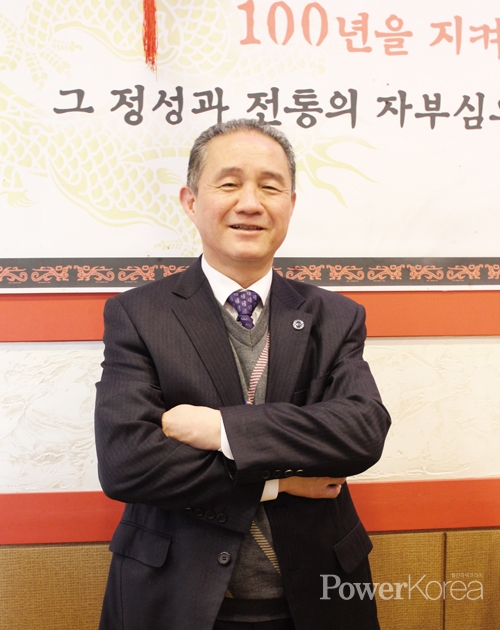- 공화춘 이현대 대표
 |
| ▲ 공화춘 이현대 대표 |
짜장면의 원조 공화춘, 그 잊혀진 맛을 되살리다
공화춘 이현대 대표
전국에서 하루 700만 그릇이 팔린다는 국민음식 짜장면. 1883년 인천항 개항과 더불어 중국 산동에서 건너온 화교들이 삶은 국수에 중국식 된장과 야채를 얹어 비벼먹는 ‘차오장멘(炸醬麵)’을 소개하면서 한국 짜장면의 역사가 시작되었다. 그리고 그 역사의 산증인이자, 오늘날 우리가 먹는 짜장면의 원조를 제시한 곳이 바로 ‘공화춘(共和春)’이다.
100년 전통의 자부심, 공화춘의 재탄생
개항 이후의 인천은 격변의 시기를 맞이하고 있었다. 일본인과 중국인 무역상들, 선교를 하러 들어온 서양인, 일자리를 찾아 바다를 건너온 수많은 중국인 하역 인부들로 인천의 풍경은 빠르게 변화하는 중이었다. 당시 부두에서 일하던 중국인 인부들은 부둣가에서 간단하게 끼니를 해결하기 위한 음식을 필요로 하고 있었고, 그렇게 탄생한 것이 짜장면의 모태가 된 ‘차오장멘’이며, 이를 발전시켜 본격적인 중화요리로서 처음 소개한 곳이 바로 ‘공화춘’이다.
공화춘은 산둥성 출신의 화교 우희광(于希光)에 의해 1905년 설립됐다. 고급 중화요리 전문점으로 이름을 떨치던 공화춘은 중국인들이 즐기던 본래의 짜장면에 돼지고기와 양파, 생강 등의 양념을 첨가해 한국인들의 입맛에 맞는 ‘한국식 짜장면’을 최초로 선보였고, 이후 국내 3대 중화요리집으로서의 명성을 구축해왔다. 그러나 70~80년대 외국인에 대한 부동산 및 재산권 행사 규제정책이 이어지면서 대다수 화교들이 경제적 기반을 잃고 하나둘씩 한국을 떠나기 시작했고, 공화춘 또한 이러한 흐름을 거스르지 못하고 1984년 폐업하게 된다. 10여년이 지난 1992년, 한중수교가 체결되며 양국 간 경제적, 문화적 교류가 다시금 활발해지기 시작했고, 이에 따라 인천시의 차이나타운 개발 사업 또한 본격적으로 추진되어 갔다. 그리고 2004년 2월 16일, 이현대 대표에 의해 짜장면의 시초 ‘공화춘’이 20년 만에 다시 그 모습을 되찾으며 오랫동안 정체되어 있던 역사의 다음 페이지를 열어젖혔다.
“나눔의 가치, 공화춘의 브랜드를 통해 전파할 터”
한국식 짜장면의 역사에서 ‘공화춘’이 갖는 상징성은 남다르다. 60~70년대엔 가족들의 특별한 외식메뉴로, 이후엔 모두가 사랑하는 대표적인 서민음식으로서 언제나 우리들의 삶 속에 자리해왔기 때문이다. 이현대 대표가 주목한 것은 바로 ‘공화춘’ 안에 숨겨진 역사적 가치였다. 이 대표는 “개항의 역사를 간직한 인천, 그리고 차이나타운에서 탄생한 문화를 상징하는 것이 바로 ‘공화춘’입니다. 하지만 너무도 오랜 시간 단절되어 있었기에 본래의 원형을 그대로 복원하기란 무척 어려운 일이었습니다”라고 설명했다. 이에 그는 수년간 공화춘에 대한 연구를 계속해왔으며, 전국을 수소문한 끝에 과거 공화춘에서 일했던 주방장을 찾아내 원조 짜장면의 맛을 되찾기에 이르렀다. 이렇게 재탄생한 공화춘은 차이나타운의 랜드마크로 자리매김했으며, 이후 차이나타운이 인천을 대표하는 명소이자, 전국민의 사랑을 받는 관광문화지역으로 발전하는 데에 혁혁한 공을 세웠다. 또한 그는 GS리테일과의 협약을 통해 로열티 없이도 상표권을 사용할 수 있도록 함으로써 전국에 공화춘의 브랜드 가치를 알리는 데에도 힘쓰고 있다.
현재 한국자유총연맹 중구지회장과 외식업 중구지부장, 차이나타운 번영회장을 역임하고 있는 이현대 대표는 차이나타운과 지역사회 발전을 위한 활동에도 적극적인 행보를 보이고 있다. 민간인 한 명 없는 섬에서 국방의 의무를 다하고 있는 우도 해병대원들을 위해 옹진구청과 협력하여 매년 짜장면 급식을 제공하고 있으며, 애향심을 고취하기 위한 ‘내 고장 바로알기’ 운동, 주변의 소외받고 불우한 이웃을 돕기 위한 ‘나눔과 섬김’ 운동에도 참여하고 있다. 2013년부터는 차이나타운의 이웃가게들과 함께 ‘착한가게’에 가입하여 수익금의 일부를 기부하고 있으며, 같은 해 8월에는 사회복지공동모금회의 고액기부자 모임인 ‘아너 소사이어티’에 인천에서 28번째 회원으로 가입하기도 했다. 이 대표는 “공화춘이 갖는 의미는 단순한 ‘최초’에 그치는 것이 아닙니다. 앞으로도 우리 지역사회의 일원으로서, 그리고 한국 음식문화를 대표하는 선두주자로서 최선을 다하겠습니다”라고 포부를 밝혔다. 100년을 이어온 공화춘의 역사와 전통이 앞으로도 그 빛을 더욱 환하게 밝히게 되길 기대한다.
Gonghwachun (CEO Lee Hyun-dae)
The father of jajangmyeon (black-bean-sauce noodles)
The noodle making that passed down 100 years
The opening of Incheon port in late 19 century filled the city with traders, missionaries and job seekers came from Japan, China and the western world. Those who worked in and around the port needed simple yet fast food for a meal and 'chaojangmen' answered the need. It was the start of what we call today 'jajangmyeon' (black-bean-sauce noodles) and it was officially introduced by Gonghwachun. Wu Hee-gwang, a Chinese from Sandeungseong region, opened the restaurant in 1905 and he added pork, onion, ginger and spices to the original Chinese noodle to create unique jajangmyeon that suits the appetite of Koreans. The noodle making lasted to 3 generations until 1970s to 80s until Korean government's restriction on real estate and property made many Chinese leave the country and the restaurant eventually closed the door in 1984. The economic and cultural exchanges between the two countries started to resume in 1992 when Korea tied diplomatic relations with China and the tie pushed forward the development of China Town in Incheon. On 16 February 2004, Lee Hyund-dae reopened Gonghwanchun to continue writing the history of the restaurant.
"The value of food is at sharing"
Gonghwachun has made a great contribution to spreading the noodle dish nationwide. Jajangmyeon was the most popular dine out food in the 60s and 70s and one of the common menus for ordinary people thereafter. Lee focuses on the history of Gonghwachun. "Gonghwachun witnessed opening of Incheon port and China Town. But it was a real hard job to recover the very taste of the noodle and the atmosphere of the restaurant. I continued my research and asked around to get as many related information as possible. Heaven helped me! I found a chef who once worked there" said Lee in retrospect. Thus reborn was Gonghwachun in the dawn of 21 century and the restaurant has grown today to be a landmark of the city. In an effort to spread the name, Lee signed a business agreement with GS Retail so that people can use the trademark without paying royalty. Apart from being the CEO of Gonghwachun, Lee is playing various other roles: the chairman of Korea Freedom Federation Jung District, the head of Korea Food Service Industry Association Jung District and the chairman of China Town Co-Op. He donates free jajangmyeon to marines on U Island every year in cooperation with Ongjin County Office and actively participates in 'Local Patriotism Movement' and 'Sharing and Serving Movement'. In 2013, he joined 'Good Store' of China Town to donate part of his profit, and also Honor Society as the 28th member of Incheon. Lee said "If Gonghwachun has reminded people of jajangmyeon so far, the restaurant will be remembered as a leader of food culture in Korea as well as a good hearted social contributor in the future." <Power Korea> wishes the tradition of Gonghwachun would last another 100 years.
임승민 기자 press0105@naver.com






